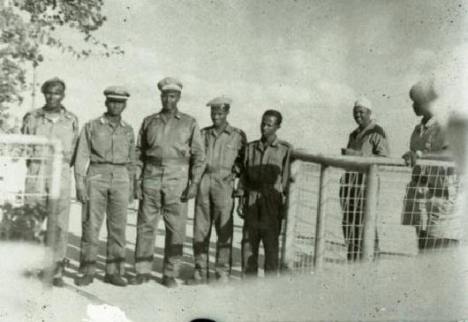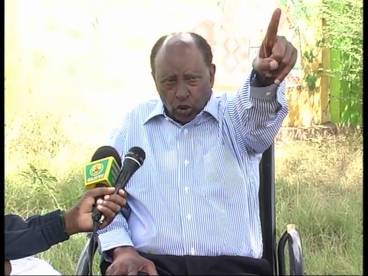Younes Osman
VIP

Despite the serious concerns described in the previous part and as articulated in poetic styles, the government did not address them the issues and the Somaliland politicians were unable to rectify the distorted situation. But the widespread dissent and injustices paved grounds for the rise dissidence.
A practical show of the rejection of the unification presented itself when a group of junior military officers of Somaliland origin attempted a military coup. Fresh from British and Egyptian military academies and colleges, the junior officers joined the Somaliland Scouts, they were indeed ingenious to evaluate to evaluate the political situation. They immediately became disenchanted with the system and the union state. They faced direct discrimination and injustices within the military force. They rightly predicted the distorted road Somaliland was set. They were young innocent officers who had no taste for power yet.
Just before the instatement of the union, in Italian Somalia, there was a frantic race and a mad rush for promotions among the armed forces. There was a wholesale officer promotion open only for the officers in the South. The officers of the Somaliland Scouts regiment of the Somaliland protectorate were not involved in the commotion and mayhem of that matter. The officers from the South before union were all from the Police force (there was no military force in Italian-administered Somalia). Contrarily, however, in Somaliland, there was a well-trained Somaliland Scouts military regiment. Most of the Its junior officers were graduates from distinguished top military academies in Britain such as Sandhurst and Mono as well as Egypt. At the time of unification, besides the well-trained army, the Somaliland Scouts of about 2000 strong. Somaliland also had its police force.
Just before the union, in Italian Somalia, many of the police officers were transferred to form a new military force even though they had no military experience and training at all. According to Abdillahi Aden ‘Congo’ and Awil Ali Duale (two of the few members of the aborted coup in 1961 to be discussed), most of the officers in the south were promoted twice. Firstly they were promoted when Somaliland independence was declared on 26 June 1960. For example, those with the ranks of Captains or Majors were promoted a rank up, i.e., dressing as Majors and Lieutenant Colonels respectively and again they were promoted another rank up when Italian Somalia became independent on 1 July 1960 as Lieutenant Colonels and colonels. Even the junior officers dressed two ranks up with some being promoted to seniors. There was plainly a mad rush for promotions. Whilst in Somalia such a scramble for higher ranks and generous bonus promotions were up for grabs, in Somaliland, owing to their loyalty, the officers from the Somaliland Scouts regiment and police did not take part, i.e., they did not make themselves promoted not even once.
In the first year of the union, some junior officers (Abdillahi Aden ‘Congo’, Awil Ali Duale and Abdillahi Said Abby) visited Mogadishu to meet up with the newly-appointed Military Commander, General Daud Abdulle Hersi and to make their complaints but the General did not listen to them.
General Hersi was a police officer of Italian Somalia. The General was the fourth in a rank of the police force in Somalia whilst General Mohamed Abshir was the highest in rank in the police force followed by General Mohamed Siyad Barre and General Abdalla Sandhere as the third in rank of the police force. General Hersi showed no sympathy to the Somaliland junior officers’ in relation to their complaints.
Meanwhile, the government’s top posts of the government were dominated by people from Somalia. Allocations were based on clan system and not on merit. Representatives from the two major clans of Somalia were the candidates for major posts. General Mohamed Abshir and General Mohamed Siyad Barre were from the same main lineage. The allocation of most important posts and portfolios involved taking turns between officers of the two main clans in Somalia (Hawiye and Darod). Abdillahi Aden Congo compares this act as a Somali children’s traditional riddle or game “ii Cug!, Cirka!’ (‘I Take this! You Take that!’) or ‘qaatay ee qaado’ (I got, you pick). Thus, taking turns was the default formula for power-sharing between the two main protagonist tribal actors.
Because of that game in play, General Siyad Barre lost his seniority post. He was second in seniority after General Mohamed Abshir and expected to be allocated to the post of military commander. But nevertheless, since General Abshir was from the same clan as Barre was allocated the post Police Commander, the post of military commander was the turn of the major rival clan. So, therefore, it went to General Daud who was the fourth in the chain of seniority (Mohamed Siyad Barre was, in fact, second the seniority after Mohamed Abshir and Abdalla Sandhere who was the third in seniority chain. Barre, a senior ahead of General Daud, was demoted to the Chief of Staff post of the Military simply because he belonged to the same clan as Mohamed Abshir. Barre was denied the post of Military Commander because of his clan affiliation to general Abshir. Siyad Bare felt bitter injustices.
The Somaliland junior officers decided to plan a military coup the aim of which was to bring back the lost independent state of Somaliland so that Somaliland would be in a better position to correct the mistakes incurred during the unification and to eventually address the unforeseen consequential issues of injustices, marginalization and domination. They saw that only in that way would Somaliland be in a stronger position to make reasonable negotiations and adjustments should it wished to unite with Somalia.
 In fact, it was only the Somaliland Scouts was still intact as an institution not yet touched with the quagmire of the politics. Immediately, after the union, almost all of the civil servants in Somaliland government offices were transferred in masses to the South. The Somaliland government in the North was dismantled and reduced to some fringe offices run by southerners and as a region with a governor. Such injustices were clearly sensed by the public in the North. The cardinal objective of the junior officers was to return Somaliland to back its independent status quo.
In fact, it was only the Somaliland Scouts was still intact as an institution not yet touched with the quagmire of the politics. Immediately, after the union, almost all of the civil servants in Somaliland government offices were transferred in masses to the South. The Somaliland government in the North was dismantled and reduced to some fringe offices run by southerners and as a region with a governor. Such injustices were clearly sensed by the public in the North. The cardinal objective of the junior officers was to return Somaliland to back its independent status quo.Who is who of the members of the coup?
The core group of the coup was initially composed of eleven officers though later increased to twenty-three. They were: 1.Hassan Abdillahi Walanwal (Hassan Kayd) (2-star lieutenant) (Buroa/Togdheer);2. Abdillahi Mohamed Aden (Abdillahi Congo) (2-star Lieutenant) (Hargeisa);3. Muhumed Abdillahi Robleh (Muhumed Awr) (2-star lieutenant); (Sahil); the rest were one-star lieutenants: 4. Abdillahi Said Abby (aka as Gamadhere) (Hargeisa); 5. Said Ali Ghir (Las Anod); 6. Mohamed Mohamoud Said ‘Bidihleh (Hargeisa); 7. Mohamed Abdirahman Haji Jama (Lugooyo) (?); 8. Faisal Haji Jama Geddi (Buroa); 9. Awil Haji Ali Dualeh (Hargeisa); 10. Abdillahi Abdi Farah ‘Deyr’ (Hargeisa); 11. Daud Ali Yahye (Borama); 12. Hussein Mohamed Bullaleh (Hussein Dakhare) (Berbera); 13. Abdillahi Ahmed Kibar (Gabiley); 14. Mohamed Warsame (Borama); 15. Mohamed Mohamoud Raghe (Berbera); 16. Abdi Yusuf (Hargeisa); 17. Mohamed Sh Muse (Sheikh); 18. Ahmed Haji Deria (Buroa); 19. Ali Harun (Buroa); 20. Said Oogle (Buroa/Togdheer); 21. Abdi Dhala Abdi (Las Anod); 22. Abdikarim Ashur (Las Qoray); 23. Abdi Ali Hussein (Abdi Habashi) (Jigjiga)

Abdillahi Aden ‘Congo’
Until today there is an archetypal myth – that those involved in the coup belonged to one clan. However, the truth of the matter is that they represented most of the clans and regions across Somaliland as they shared the same common feelings – the imbalance power, the injustices and inequalities in the military force and the way Somaliland independence was handled at the time. Therefore, the officers stood for a unique experience. Some senior officers who were not involved today express that the junior officers were young fresh graduates, inexperienced and understood no politics. I retain the opinion that the junior officers were right and they did it for that reasons and not for a search of power as seniors would have liked.
https://somalilandstandard.com/the-rebirth-of-somaliland-4-the-1961-aborted-military-coup/
